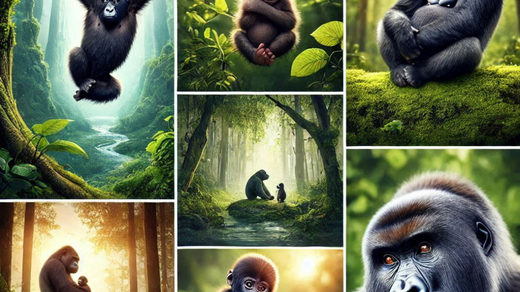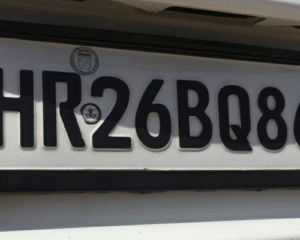Raising Awareness About Baby Gorillas Through Hafez’s Journey

Baby Gorillas
Hafez’s Background and Story
Hafez, a baby gorilla with a powerful story of survival and determination, serves as a beacon of hope for wildlife conservationists worldwide. Rescued from the clutches of illegal wildlife traffickers at Istanbul Airport, his journey to safety sheds light on the harsh realities faced by endangered species like gorillas. Hafez’s rescue not only signifies the atrocities of smuggling but also emphasizes the critical need for stringent enforcement measures and collaborative conservation initiatives to safeguard the future of these majestic animals.
The Importance of Baby Gorillas in the Ecosystem
Hafez’s Background and Story offer a glimpse into the intricate web of interconnectedness within the ecosystem. As a baby gorilla, he embodies the fragility and resilience of his species, showcasing how their well-being is essential in maintaining the balance of nature. Through his journey, we come to understand the profound impact that each baby gorilla has on the ecosystem, from their role in seed dispersal to their contribution to the biodiversity of their habitats.
The presence of baby gorillas in the ecosystem signifies not only the intrinsic value of their species but also their immense significance in sustaining the delicate harmony of their surroundings. As they grow and navigate their environment, baby gorillas play a crucial role in shaping the landscape and ensuring the survival of various plant and animal species. Their existence reminds us of the interconnectedness of all living beings and the importance of preserving their habitats for the benefit of present and future generations.
Challenges Faced by Baby Gorillas in the Wild
Baby gorillas face numerous challenges in the wild, from natural predators to habitat loss due to human activities. With their reliance on forests for food and shelter, deforestation poses a significant threat to their survival. Additionally, poaching remains a constant danger for baby gorillas, as their small size and vulnerability make them easy targets for hunters seeking to profit from the illegal wildlife trade.
Furthermore, the spread of diseases, such as the Ebola virus, can devastate gorilla populations, with infants particularly susceptible to infection. This health risk, compounded by the impacts of climate change and human encroachment, puts additional pressure on the already fragile existence of baby gorillas in their natural habitats. As such, addressing these multifaceted challenges requires a holistic approach that combines conservation efforts, public awareness campaigns, and sustainable practices to ensure the long-term well-being of these endangered primates.
Conservation Efforts for Baby Gorillas
Hafez, a rescued baby gorilla, stands as a beacon of hope in the fight for conservation. His ordeal at Istanbul Airport sheds light on the harsh reality of wildlife trafficking and the grave threats faced by baby gorillas in the wild. With each successful rescue like Hafez’s, the collective efforts of enforcement agencies, conservationists, and communities worldwide are reinforced in their mission to safeguard the future of these gentle primates.
The conservation efforts for baby gorillas extend beyond mere rescue missions. Rehabilitation programs play a crucial role in helping these vulnerable animals adapt to new environments and regain their strength. By providing proper care, nourishment, and socialization, these initiatives aim to equip baby gorillas with the necessary tools for survival in the wild.
Hafez’s Impact on Raising Awareness
Hafez’s journey from the brink of exploitation to becoming a beacon of conservation awareness has struck a chord with people worldwide. His story serves as a powerful reminder of the threats faced by baby gorillas in the wild and the urgent need for collective action to safeguard their future. Through Hafez’s resilience and the dedicated efforts of conservationists, the plight of baby gorillas has garnered increased attention and support on a global scale.
As Hafez continues to captivate audiences with his story of survival and rehabilitation, more individuals are inspired to take a stand against wildlife trafficking and habitat destruction. The impact of Hafez’s narrative extends beyond his own well-being, serving as a catalyst for heightened awareness and advocacy for the protection of all baby gorillas and their natural habitats. By raising awareness of the challenges faced by baby gorillas, Hafez has become a powerful ambassador for wildlife conservation, igniting a wave of empathy and action towards ensuring a brighter future for these majestic creatures.
The Role of Zoos in Protecting Baby Gorillas
Zoos play a crucial role in protecting baby gorillas by providing a safe environment for their care and rehabilitation. These facilities offer expert veterinary care, specialized diets, and enrichment activities tailored to mimic the gorillas’ natural habitat. Additionally, zoos often collaborate with conservation organizations to support wild gorilla populations through research, breeding programs, and public education initiatives.
By showcasing baby gorillas to visitors, zoos raise awareness about the threats facing these incredible animals in the wild. Seeing these majestic creatures up close helps to foster empathy and understanding, inspiring many to take action towards conservation efforts. Zoos also serve as hubs for research and data collection, contributing valuable knowledge to aid in the protection and preservation of baby gorillas and their habitats.
Ways to Support Baby Gorilla Conservation
To support baby gorilla conservation efforts, one can contribute by donating to reputable organizations dedicated to protecting endangered species. These donations help fund essential research projects, habitat preservation initiatives, and anti-poaching efforts aimed at safeguarding the well-being of baby gorillas in the wild. Additionally, raising awareness about the threats faced by baby gorillas through social media campaigns, educational programs, and community outreach can play a crucial role in garnering public support and mobilizing action towards conservation goals. By advocating for stronger conservation policies and sustainable practices, individuals can make a meaningful impact in ensuring a brighter future for baby gorillas and their ecosystems.
The Future of Baby Gorillas
As efforts continue to protect and conserve baby gorillas in their natural habitats, the future holds both challenges and opportunities. With ongoing threats such as habitat loss, poaching, and disease, the survival of these majestic animals remains a concern. However, through dedicated conservation initiatives, the hope is to secure a stable and thriving future for baby gorillas in the wild.
Education and awareness play a critical role in shaping the future for baby gorillas. By promoting sustainable practices, supporting local communities, and enhancing research efforts, we can work towards ensuring a better tomorrow for these vulnerable species. Each individual has the power to make a difference by advocating for conservation, supporting ethical tourism, and supporting organizations dedicated to protecting baby gorillas and their ecosystems.
Educational Opportunities for Learning About Baby Gorillas
For individuals keen on delving deeper into the world of baby gorillas, educational opportunities present an enriching pathway. Various wildlife organizations and conservation centers offer tailored programs, workshops, and guided tours that provide valuable insights into the lives, behaviors, and conservation efforts surrounding these majestic creatures. Through interactive sessions, participants can learn about the challenges faced by baby gorillas in the wild, the importance of their role in the ecosystem, and the intricate web of conservation strategies aimed at their protection and well-being.
Moreover, virtual platforms and online resources play a pivotal role in educating a wider audience about baby gorillas and the pressing need for their conservation. With the convenience of digital learning, individuals can explore documentaries, webinars, and educational materials that offer in-depth knowledge about the habits, habitats, and conservation status of baby gorillas. By engaging with these resources, people can broaden their understanding, deepen their appreciation for these remarkable animals, and become advocates for their preservation in the wild.
How Individuals Can Make a Difference for Baby Gorillas
Individuals play a crucial role in supporting the conservation of baby gorillas. One impactful way to make a difference is by donating to reputable organizations that work towards protecting and preserving gorilla habitats. By contributing financially, individuals can help fund vital conservation projects, educational initiatives, and anti-poaching efforts that directly benefit baby gorillas and their ecosystems.
Another way individuals can make a positive impact is by raising awareness about the challenges faced by baby gorillas in the wild. By sharing information about illegal wildlife trafficking, habitat destruction, and the importance of conservation, individuals can help educate others and inspire action. Through social media, speaking engagements, and community events, individuals can amplify the message of conservation and the importance of protecting baby gorillas for future generations.








